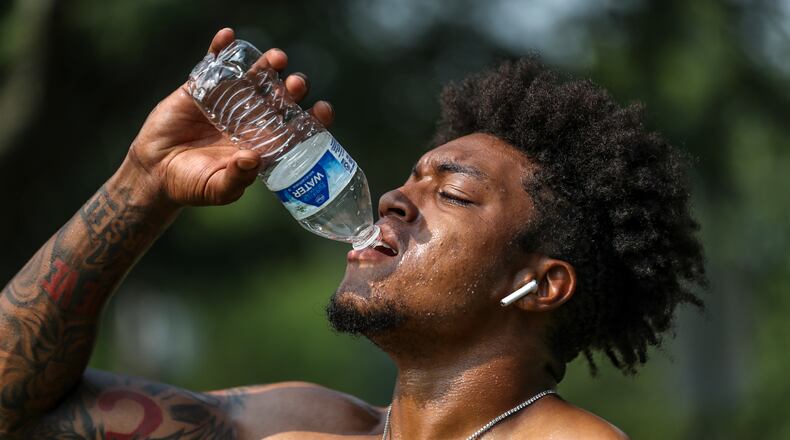For Arena Williams, 84, the pleasure of sharing meals and activities with her peers is what draws her to the New Horizons Neighborhood Senior Center west of Downtown Atlanta almost every day. But on Tuesday, as temperatures in the city climbed into the mid-90s, the facility served another purpose for her and other older residents: a reprieve from the heat.
Williams, a retired administrative clerk, said only one of the two air conditioning units at her house in Spring Park in Southwest Atlanta works. She’s put off fixing the other over cost concerns — and even though inside temperatures often hover around 80 degrees, she tries not to run her AC much, to keep her electricity bill down. To stay cool, Williams said she sometimes puts damp towels on her head and drinks lots of water.
”It’s warm, but, you know... you turn the fans on,” Williams said.
As a “heat dome” that has baked Texas and much of the western U.S. for weeks drifted east on Tuesday, experts warned that potentially dangerous conditions could persist across much of Georgia for the next several days.
While the heat is not predicted to break records, the combination of high temperatures and stifling humidity — especially later in the week — could pose a risk to Georgians, like Williams, who are most vulnerable to heat illness.
Credit: arvin.temkar@ajc.com
Credit: arvin.temkar@ajc.com
The National Weather Service forecast temperatures climbing into the mid-90s on Tuesday in Atlanta, with areas in the southern half of the state possibly approaching triple digits. Wednesday and Thursday could feel even hotter as the humidity ratchets up, creating heat index temperatures of 105 or higher in parts of the state. And relief is not likely until the weekend, with temperatures in the mid to high-90s forecast through Friday.
The city of Atlanta did not open a cooling center for residents Tuesday. It was not immediately clear whether those facilities would open their doors as the heat persists.
Adding to the misery and amplifying health concerns was a thick layer of smoke that was blanketing Atlanta, foul air that has drifted south all the way from Canada, where enormous wildfires — fueled by hot, dry conditions made more likely by climate change — have been burning for months. The metro area was under a “code orange” air quality alert Tuesday, meaning pollutant levels were considered unhealthy for sensitive groups.
The heat comes during what has been a scorching summer for much of the planet. Earth had its hottest June in 174 years of global recordkeeping, and several locations in the Southwestern U.S. set all-time heat records, according to the federal National Oceanic and Atmospheric Administration. The brutal conditions enveloping much of the country have shown little sign of abating so far in July.
The links between human-caused climate change and extreme heat have been known for decades. Countless studies have found that as the planet warms — primarily due to emissions of greenhouse gases from the burning of fossil fuels — heat waves are expected to grow more frequent, intense and long-lasting.
Georgia was one of the few places in the Northern Hemisphere that did not experience exceptional heat in June — in fact, it was the state’s 19th-coolest such month on record.
Still, the first six months of 2023 have been the 3rd-hottest start to a year the state has experienced since 1895.
And the state has not been immune to the global warming trend. Federal data show average temperatures in Atlanta have climbed roughly 3 degrees since 1930, with similar increases observed in other parts of the state.
Atlanta also experiences around six more heat waves — a stretch of two or more days with abnormally warm temperatures — each year than it did 60 years ago, according to an analysis of federal data. That trend is expected to continue.
Several studies, including some research conducted in Atlanta, have found that surface temperatures can vary widely across an urban area.
Neighborhoods with more tree cover are often much cooler than those covered with buildings and heat-absorbing pavement. And often, those parts of the city with less vegetation are home to more lower-income residents and communities of color.
“The planet as a whole has grown warmer, the city has gotten warmer, and we are increasingly moving into a period of time where we’re going to have more and more days when temperatures are in the 90s or the 100s,” said Brian Stone, the director of Georgia Tech’s Urban Climate Lab. “That’s when the heat risk becomes really pronounced.”
But the temperatures Atlanta and much of the country have already experienced can and, tragically, do kill people.
Heat is linked to an average of 702 deaths in the U.S. each year, more than any other extreme weather event. The actual death toll is likely much greater, studies have shown. Still, experts say heat waves rarely get the same attention disasters like hurricanes and tornadoes do.
“It doesn’t knock down buildings or turn over cars, but that doesn’t mean it’s not a very significant health threat,” Stone said.
Credit: arvin.temkar@ajc.com
Credit: arvin.temkar@ajc.com
The risk of serious illness or death from heat exposure also is not distributed evenly. Those most at-risk of complications include children, the elderly, pregnant women and those with certain medical conditions, like heart and lung issues, according to the Centers for Disease Control and Prevention.
“It can seem like a nuisance, but it’s much more than that,” said Chris Uejio, an associate professor at Florida State University whose research focuses on heat and public health. “High temperatures and often high humidity as well can essentially limit the body’s ability to thermal regulate.”
Outdoor workers, athletes, unhoused people and those without air conditioning are also more vulnerable.
In 2021, the U.S. Department of Labor announced its intention to issue new, mandatory protections to prevent heat injury and illness in the workplace. Employers are required to provide a safe working environment under a general duty clause of the Occupational Safety and Health Act of 1970, but there are no specific protections for exposure to heat like there are for certain chemicals, for example. In the absence of federal laws, a small handful of other states have passed their own heat safety rules that include things like mandated shade and water breaks, but Georgia has not.
A note of disclosure
This coverage is supported by a partnership with 1Earth Fund, the Kendeda Fund and Journalism Funding Partners. You can learn more and support our climate reporting by donating at ajc.com/donate/climate/
Keep Reading
The Latest
Featured




